Every year in late summer, London plays host to The Proms, a series of classical music concerts held in the Royal Albert Hall, South Kensington. The Albert Hall was built in memory of Queen Victoria’s husband Prince Albert in 1871 and stands opposite the Albert Memorial in Hyde Park. It has a capacity of over 5,000 and is always packed out for the Last Night of The Proms in September, an event that is as much about patriotism as music.
Promenade concerts originated in London’s pleasure gardens, such as those found in Vauxhall. Their name comes from the fact that the audience was allowed, even encouraged, to walk or ‘promenade’ while the music was being played. Today the audience does not generally move around during concerts, but promenaders – ‘prommers’ for short – can sit on the floor in an open area in front of the orchestra at the Albert Hall.
Today’s Proms were founded in 1895 by Robert Newman, a musical impresario who hired the then little-known conductor Henry Wood, aged just twenty-six, as the conductor. Wood became so inextricably identified with The Proms that they are officially called The Henry Wood Promenade Concerts presented by the BBC, the public service broadcaster that broadcasts the concerts every evening on the radio and sometimes live on television.
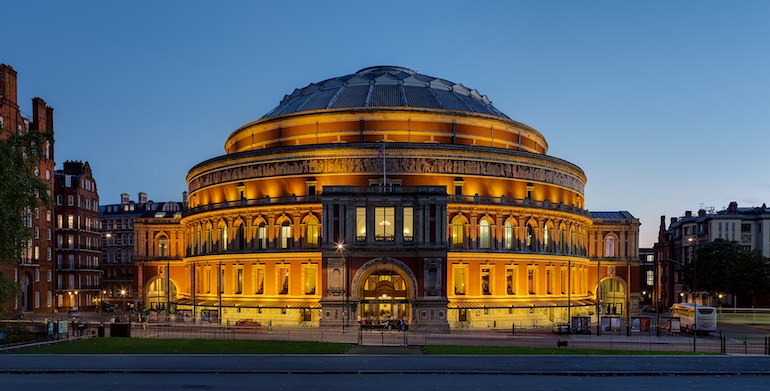 Outside the Royal Albert Hall during the BBC Proms season of 2008. Photo Credit: © Amanda Slater via Wikimedia Commons.
Outside the Royal Albert Hall during the BBC Proms season of 2008. Photo Credit: © Amanda Slater via Wikimedia Commons.
Wood, nicknamed ‘old timber,’ became a benevolent dictator of The Proms. When the Second World War started, and London was the target of bombing during the Blitz of 1940, The Proms was moved out of the capital. The original venue, the Queen’s Hall, was destroyed in an air raid in 1941 and Wood supervised the relocation of The Proms to the Albert Hall. During The Proms season, his bust is displayed in the hall in front of the organ.
The Proms continued during both the First and Second World Wars. Despite facing great pressure to ban the works of German composers such as Beethoven, Bach, and Brahms, Wood insisted on retaining them, believing that a series of classical music concerts without the music of Germany was unthinkable. He was also responsible for arranging the position of the musicians in an orchestra in a layout that is now widely accepted as standard.
After Wood’s death in 1944, various conductors were in charge of The Proms, the most famous of them being Sir Malcolm Sargent, who lived next to the Albert Hall. Sargent, nicknamed ‘Flash Harry’ because of his sartorial style, was much loved by the promenaders and introduced the tunes which make up the second part of the Last Night of The Proms after he had chosen them for a concert in the Royal Festival Hall, Waterloo in 1951.
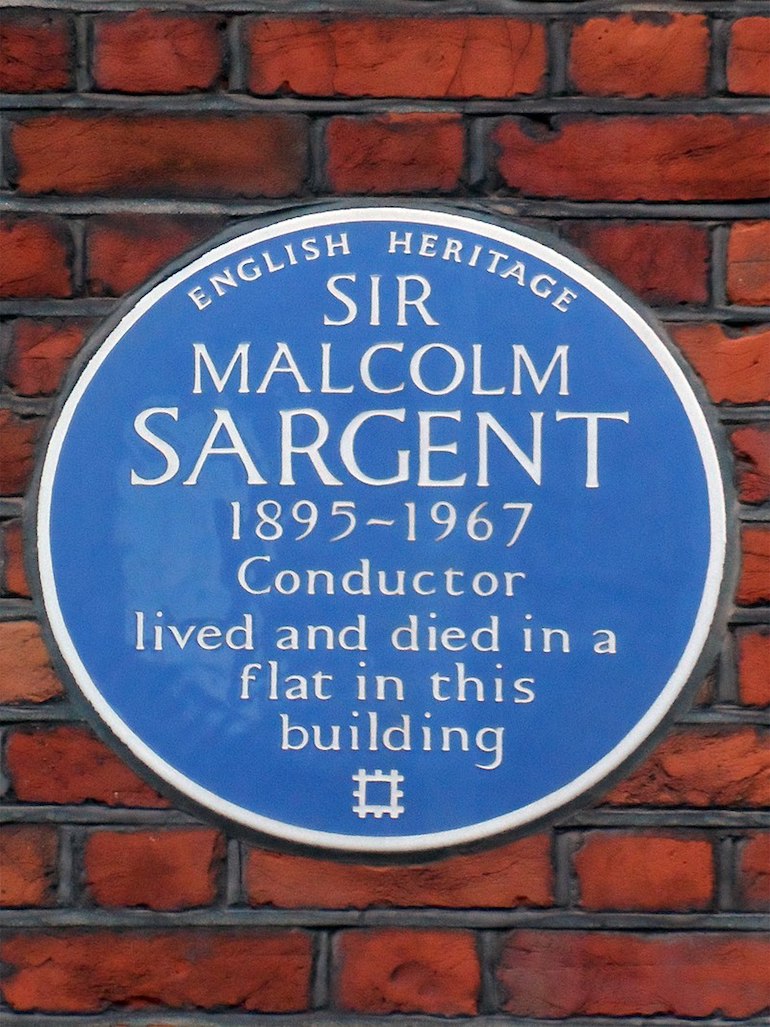 Blue plaque for Sir Malcolm Sargent. Photo Credit: © Spudgun67 via Wikimedia Commons.
Blue plaque for Sir Malcolm Sargent. Photo Credit: © Spudgun67 via Wikimedia Commons.
These include the poem Jerusalem with words written by William Blake, which were set to music by Hubert Parry in 1916; Rule Britannia by Thomas Arne; Pomp and Circumstance March by Edward Elgar, accompanied by the words of Land of Hope and Glory and Henry Wood’s arrangement of a Fantasia of British Sea Songs. The audience then lustily joins in the signing of God Save the Queen and Auld Lang Syne while enthusiastically waving their flags.
Sargent’s final appearance at The Proms was on the last night of 1967 when he was too ill to conduct but, wearing a trademark white carnation in the buttonhole of his jacket, made a short speech to the audience and promised that he would be back to see them next year. It was not to be. Two weeks later, Sargent died of cancer. Many people loved him because he insisted on returning to Britain during the war years and remained here despite the dangers.
On one occasion, Sargent was conducting Beethoven’s seventh symphony when an air raid warning was sounded. Sargent turned to the audience and said he would continue to conduct this work (by a German composer) ‘which no one could destroy.’ Anyone in the audience or orchestra was welcome to leave if they chose to do so, but he would not be moving. The entire audience remained seated until the end of the performance.
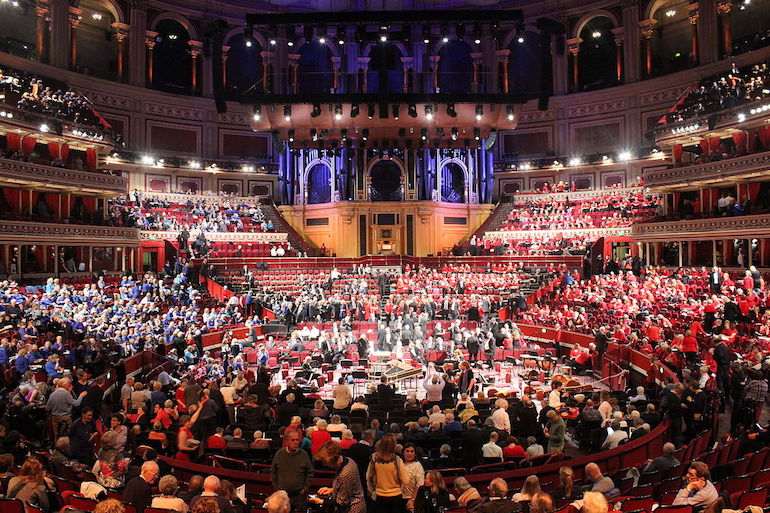 A promenade concert in the Royal Albert Hall, 2004. Photo Credit: © MykReeve via Wikimedia Commons.
A promenade concert in the Royal Albert Hall, 2004. Photo Credit: © MykReeve via Wikimedia Commons.
The Proms are an inextricable part of the London cultural season, but they are not frozen in time. Although the last night is a celebration of patriotism and flag-waving, new works by living composers are constantly introduced and performed alongside more famous ones. In 2020 a new arrangement of Jerusalem by Belize-born composer Erollyn Wallen MBE was sung at the Last Night and dedicated to the Windrush generation of immigrants to Britain.
Wallen is one of a number of female and ethnic minority musicians to have been featured in The Proms. The black London-born composer Samuel Coleridge Taylor was championed by Henry Wood, who performed works by him. Wood also introduced women into the orchestra – although he preferred them to play only string instruments. In 2013 Marin Allsop became the first woman to conduct the orchestra at the Last Night of The Proms.
The Last Night has become so popular that since 1996 it has spilled out into Hyde Park in Proms in the Park for those unable to buy a ticket to go into the Albert Hall. The outdoor audience joins in the celebrations, which are broadcast to them on a big screen. Since 2000 Proms in the Park has also been seen around the UK in places like Glasgow, Belfast, Manchester, and Swansea, with each city adding its own local character to the festivities.
The Proms season of 2020 went ahead but was performed at an empty Albert Hall because of the necessity of preventing the formation of large crowds during the coronavirus pandemic. The BBC broadcasted them as usual, and despite the inevitably low-key nature of the season, they kept alive The Proms tradition of combining well-known and popular classical music pieces with more challenging modern compositions.
London’s Blue Badge Tourist Guides conduct tours of Hyde Park and the Albert Memorial and can introduce visitors to major venues such as the Royal Albert Hall.



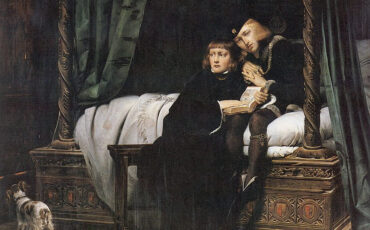


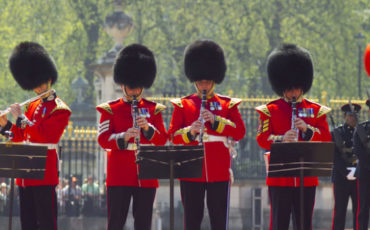
Leave a Reply